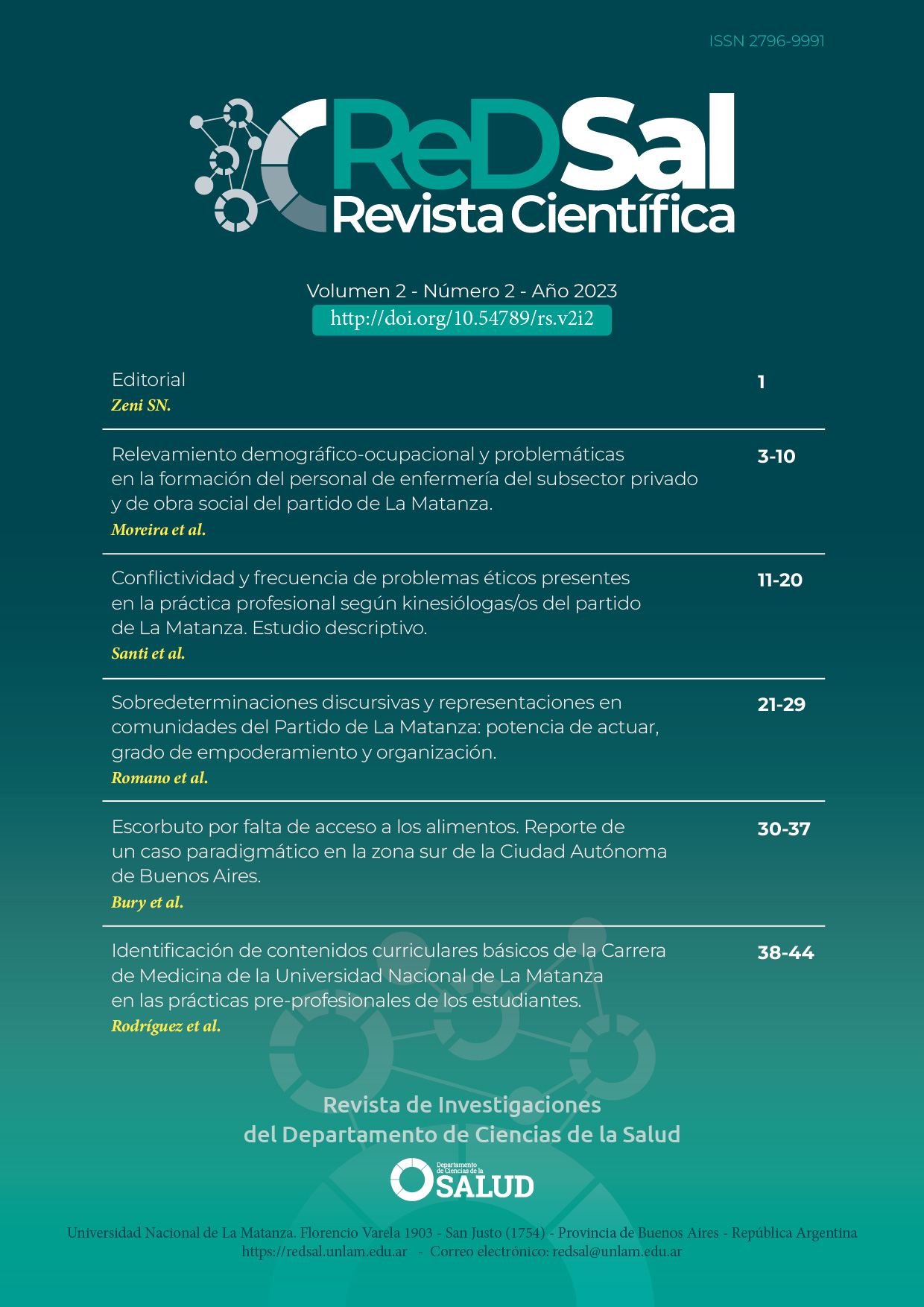Discursive overdeterminations and representations in Partido de La Matanza communities: power to act, degree of empowerment and organization.
DOI:
https://doi.org/10.54789/rs.v2i2.24Keywords:
organizations, psychological power, mental disorders, community health, community characteristics, isolationAbstract
This work synthesizes a research project that proposed an interdisciplinary approach of its complex object of study, namely: the community, its power and representation of itself. The task carried out in some communities of Partido de La Matanza consisted in detecting representations of their power for collective action and of themselves, in order to understand their impacts on health and problem solving.
The first stage of the research was qualitative and exploratory group interviews were used as tools whose purpose was to obtain variables. Once the qualitative stage was completed, the following variables were selected: organization, psycho-physical-social health, security regarding crimes and degree of community empowerment. Each one was measured based on indicators embodied in an instrument. In the quantitative stage, a survey with 18
questions was developed. In total there were 450 surveys. Survey takers and a statistical expert were hired to organize the results obtained.
In general, a low participation in community activities and meetings will be drawn. Of those attending the meetings (32%), 18% say that the community itself has the possibility of solving some problems that arise in the neighborhood. Based on considerable data, it was concluded that the general state of the communities reveals a certain vulnerability, that they do not perceive themselves as having sufficient potential for change, that the level of organization to face problems together is low.
References
Bourdieu P, Wacquant L. Una invitación a la sociología reflexiva. 1ra Ed. Buenos Aires: Siglo Veintiuno Editores; 2005.
Celener de Nijamkin G, Guinzbourg de Braude M. El cuestionario desiderativo. Lugar Editorial; 1996.
Freud S. El Malestar en la cultura. En: Obras Completas, Vol. XXI. Buenos Aires: Amorrortu Editores; 1976. p.57-140.
Abric JC. Prácticas sociales y representaciones. 1ra Ed. México D.F.: Ediciones Coyoacán; 2001.
Martín-Baró I. Psicología de la Liberación. Madrid: Trotta; 1998.
Esposito R. Communitas: Origen y destino de la comunidad. Buenos Aires: Amorrortu editores; 2007.
Quijano A. Colonialidad del poder, eurocentrismo y América Latina. En: Edgardo Lander, compilador. La Colonialidad del saber: eurocentrismo y ciencias sociales. Perspectivas Latinoamericanas. CLACSO; 2000. p.122-151.
Ulloa, FO. La difícil relación del psicoanálisis con la no menos difícil circunstancia de la salud mental. En: La Novela Clínica Psicoanalítica. Buenos Aires: Paidós; 1996. p. 231-256.
Alcantara-Moreno G. La definición de salud de la Organización Mundial de la Salud y la interdisciplinariedad. Sapiens-Revista Universitaria de Investigación [Internet]. 2008;9(1):93-107. Disponible en: https://www.redalyc.org/pdf/410/41011135004.pdf
Krotz E. Alteridad y pregunta antropológica. Alteridades [Internet]. 1994;4(8):5-11. Disponible en: https://alteridades.izt.uam.mx/index.php/Alte/article/view/585/583
Laurell AC. La Salud-Enfermedad como proceso social. Cuadernos médico-sociales [Internet]. 1982,19:1-11. Disponible en: https://red.amr.org.ar/wp-content/uploads/sites/3/2015/10/n19a061.pdf

Downloads
Published
How to Cite
Issue
Section
License
Copyright (c) 2023 ReDSal

This work is licensed under a Creative Commons Attribution 4.0 International License.








